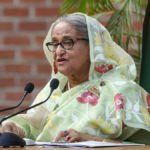DHAKA: Bangladesh votes Sunday in an election guaranteed to give Prime Minister Sheikh Hasina her fifth term in office, after a boycott by opposition parties whose ranks have been decimated by mass arrests.
Hasina’s ruling Awami League has presided over exceptional growth in a country once beset by grinding poverty, thanks to a lucrative garment export industry supplying the world’s top fast fashion brands.
But her tenure has also been marred by widespread human rights abuses, with her security forces accused of extrajudicial killings, laws curtailing press and civic freedoms, and a ruthless crackdown on the opposition.
The Awami League faces few or no effective rivals in the seats it is contesting but has not fielded candidates for a small minority of seats, an apparent effort to avoid the legislature being branded a one-party institution.
Many young voters say they have no intention of participating in a contest they see as lacking a genuine choice.
“I’m not wasting my time for a one-sided election,” computer science graduate Sohanur Rahman, 28, told AFP in Dhaka.
The main opposition Bangladesh Nationalist Party (BNP) and other parties staged a series of rallies last year demanding Hasina step down in favour of a neutral caretaker government to oversee Sunday’s vote.
Around 25,000 opposition cadres including the BNP’s entire local leadership were arrested in the ensuing crackdown, the party says – the government puts the figure at 11,000 – and tens of thousands more are in hiding.
Politics in the world’s eighth-most populous country was long dominated by the rivalry between Hasina, the daughter of the country’s founding leader, and two-time premier Khaleda Zia, wife of a former military ruler.
Hasina, 76, has been the decisive victor since returning to power in a 2009 landslide, and consolidating her power with two subsequent polls accompanied by widespread irregularities and accusations of rigging.
Zia, 78, was convicted of graft in 2018 and is now in ailing health at a hospital in the capital Dhaka.
Her son Tarique Rahman has helmed the BNP in her stead from London, where he has lived in exile since 2008, facing several criminal convictions at home.
Rahman told AFP that his party, along with dozens of others, had refused to participate in a vote with a “predetermined” outcome.
“Participating in an election under Hasina, against the aspirations of the Bangladeshi people, would undermine the sacrifices of those who fought, shed blood and gave their lives for democracy,” he said.
‘Stage-managed show’
Hasina has accused the BNP of arson and sabotage during last year’s protest campaign, which was mostly peaceful but saw several people killed in police confrontations.
Bangladesh’s security forces have long been dogged by allegations of excessive use of force – charges denied by her government.
The United States, the biggest export market for the South Asian nation of 170 million, sanctioned an elite police unit and its top commanders accused of extrajudicial killings and enforced disappearances.
Analysts and opposition leaders say Hasina will seek to bolster the vote’s credibility by using a carrot-and-stick approach to drive up turnout, including threats to withhold government benefits for those who do not vote.
“It won’t be appropriate to call it an ‘election’ by any standard,” Illinois State University professor Ali Riaz told AFP.
‘Potentially dangerous combination’
Hasina’s economic stewardship had long been a central pillar of her popularity, but economic headwinds have seen rapid rises in the cost of everyday food staples.
A balance of payments issue left Bangladesh unable to source enough fossil fuels for its power plants in 2022, prompting months of regular blackouts.
Wage stagnation in the garment sector, which accounts for around 85 percent of the country’s $55 billion in annual exports, sparked industrial unrest late last year that saw some factories torched and hundreds more shuttered.
Pierre Prakash of the International Crisis Group said that frustrations with the vote could portend political violence in the aftermath.
That could prompt increased government repression, a hit to investor confidence and possibly further sanctions from Washington that would “likely deepen the country’s economic woes”, he added.
Hasina’s government was clearly “less popular than it was a few years ago, yet Bangladeshis have little real outlet at the ballot box”,“ Prakash said.
“That is a potentially dangerous combination.”
Source: AFP







